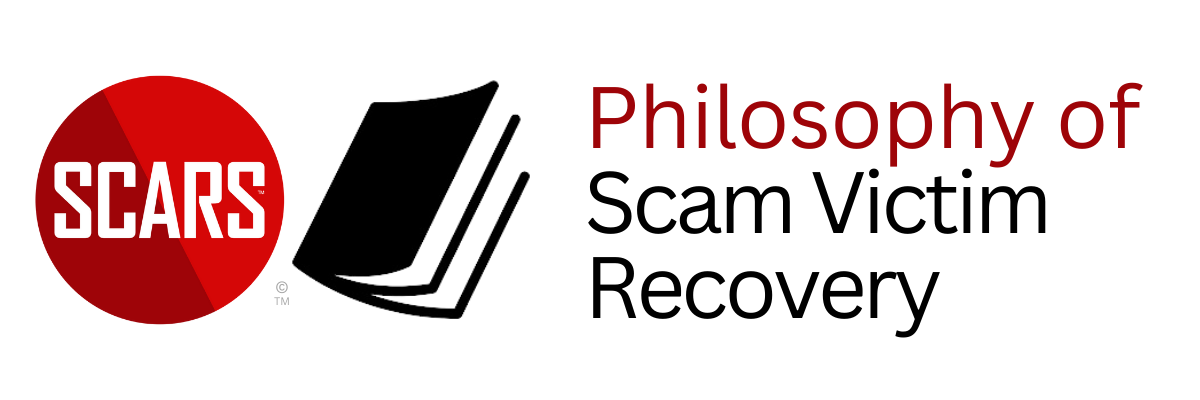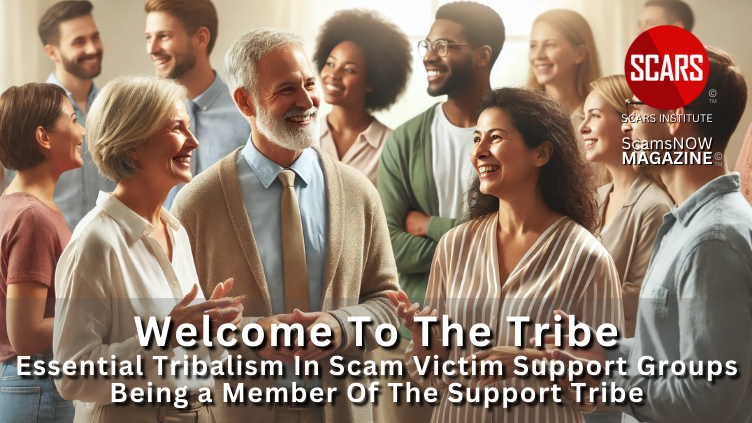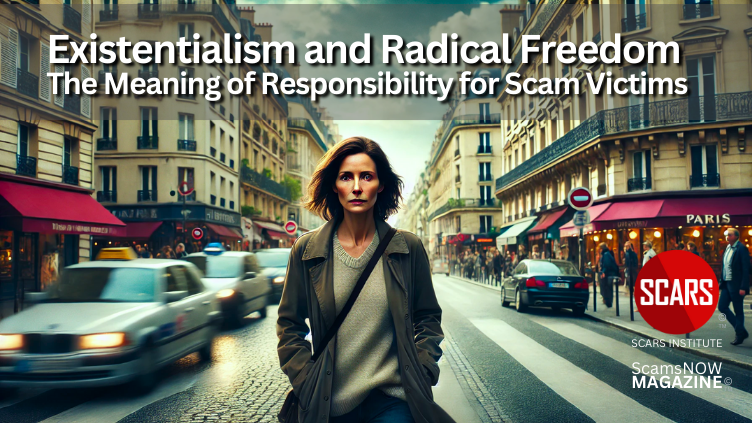Existentialism and Radical Freedom – the Meaning of Responsibility for Scam Victims
Existentialism – Radical Freedom and Responsibility: Owning the Consequences of Our Actions and Mistakes – a Scam Victim Recovery Perspective
Primary Category: Scam Victim Recovery Philosophy
Intended Audience: Scam Victims-Survivors / Family & Friends
Authors:
• Vianey Gonzalez B.Sc(Psych) – Licensed Psychologist, Specialty in Crime Victim Trauma Therapy, Neuropsychologist, Certified Deception Professional, Psychology Advisory Panel & Director of the Society of Citizens Against Relationship Scams Inc.
• Tim McGuinness, Ph.D., DFin, MCPO, MAnth – Anthropologist, Scientist, Polymath, Director of the Society of Citizens Against Relationship Scams Inc.
About This Article
Radical freedom in existentialist thought emphasizes that individuals are not only free to make choices but are also responsible for the consequences of those choices. This responsibility extends beyond just their own actions—it also applies to how they handle the effects of other people’s choices. Scam victims, for example, did not choose to be deceived, but they must still bear the emotional, financial, and psychological consequences of the scammer’s actions. While it is natural to feel regret for trusting the wrong person, radical freedom is not about assigning blame; rather, it is about recognizing that only the victim has the power to take control of their recovery and healing.
This distinction is important because, at first, the concept of radical freedom can sound like judgmentalism, as if it implies victims are at fault for what happened to them. However, it is not about blaming victims for the crime—it is about acknowledging that no one else can undo the past or dictate their future. Accepting responsibility for recovery is not the same as accepting blame for the harm caused. It is an act of reclaiming agency, refusing to let the scam define one’s identity, and making choices that foster healing and growth. Radical freedom, then, is not a burden but a pathway to empowerment, allowing victims to move forward with resilience and self-determination.

Existentialism – Radical Freedom and Responsibility: Owning the Consequences of Our Actions and Mistakes – a Scam Victim Recovery Perspective
Existentialism and Radical Freedom – the Meaning of Responsibility for Scam Victims
In existentialist thought, radical freedom is not just about the ability to make choices—it also carries with it the inescapable burden of responsibility. Since there is no predetermined essence or external force dictating our actions, we must take full ownership of both our successes and our failures. This means that when we make mistakes, we cannot shift blame onto fate, society, or external circumstances—we are responsible for the consequences of our choices.
Radical Freedom and Moral Responsibility
Jean-Paul Sartre, one of the leading figures of existentialism, famously stated, “Man is condemned to be free.” This means that while we are free to make choices, we are also condemned to bear responsibility for them. Unlike deterministic philosophies that suggest our actions are shaped by fate or divine will, existentialism asserts that every decision we make reflects our values and shapes who we are. Every action we take defines us—and with that comes accountability.
For example:
-
-
- If a person chooses to betray a friend, they cannot simply say, “I had no choice.” They did have a choice and must accept the consequences of that betrayal.
- If someone fails in a pursuit, they must own that failure instead of blaming others or circumstances.
- If a person allows fear to prevent them from pursuing a meaningful life, they are responsible for the stagnation they experience.
-
Avoiding Bad Faith: The Danger of Excuses
Existentialism warns against “bad faith” (mauvaise foi)—the act of deceiving oneself to escape responsibility. People often create excuses to avoid the weight of their decisions:
-
-
- Blaming society (“I had no other options.”)
- Blaming fate (“It was meant to be.”)
- Blaming others (“They made me do it.”)
-
However, radical freedom denies these excuses. While external factors influence us, they do not determine us. We always have the ability to choose our response to any situation, even in the face of hardship.
The Growth That Comes From Taking Responsibility
Accepting responsibility for our mistakes is not just a burden—it is also empowering. When we acknowledge that we are the authors of our own lives, we gain the ability to learn, grow, and change. Mistakes are inevitable, but they are also opportunities for self-reflection and self-improvement.
For example:
-
-
- A person who recognizes they have treated others poorly can choose to make amends and change their behavior.
- Someone who has wasted years in an unfulfilling job can decide to take a new path instead of resigning themselves to regret.
- A person who has allowed fear to control them can choose to face their fears rather than continue to let them dictate their life.
-
Freedom and Consequences: The Reality of Choice
Radical freedom means that actions have consequences—we are responsible not just for what we do but also for the effects of our actions on others and the world. If we choose poorly, the results may be painful, but ignoring that responsibility does not erase the consequences. Instead, existentialism calls us to own our mistakes, reflect on them, and make better choices moving forward.
Ultimately, radical freedom is both a privilege and a burden. It grants us the ability to shape our own destiny but demands that we accept responsibility for our failures as well as our triumphs. By embracing this responsibility, we do not just endure life—we actively create it.
Radical Freedom and Responsibility: Owning the Consequences of Our Actions and the Choices of Others
In existentialist thought, radical freedom is not just about the ability to make choices—it also carries with it the inescapable burden of responsibility. Since there is no predetermined essence or external force dictating our actions, we must take full ownership of both our successes and our failures. This means that when we make mistakes, we cannot shift blame onto fate, society, or external circumstances—we are responsible for the consequences of our choices.
However, there is another layer to this responsibility: other people also have radical freedom. Just as we are free to make our own choices, so too are others, and sometimes their choices cause harm to us and others. When this happens, it is easy to fall into self-blame—thinking that we should have seen the signs, made a different decision, or avoided them altogether. But while we are responsible for our own choices, we are not to blame for the harmful choices of others.
Radical Freedom, Moral Responsibility, and the Actions of Others
Jean-Paul Sartre famously stated, “Man is condemned to be free.” This means that while we are free to make choices, we are also condemned to bear responsibility for them. Unlike deterministic philosophies that suggest our actions are shaped by fate or divine will, existentialism asserts that every decision we make reflects our values and shapes who we are. Every action we take defines us—and with that comes accountability.
However, Sartre also emphasized that other people exist with the same freedom. They, too, make choices based on their own motives, desires, and personal beliefs. Sometimes, these choices intersect with our lives in painful ways—a betrayal, a scam, an act of cruelty or selfishness. When this happens, we often feel trapped in a contradiction: we chose to trust them, to interact with them, to be part of their lives—but we did not choose their actions.
This is where existential responsibility becomes complex. While we are not to blame for the harm others do to us, we are still responsible for dealing with the consequences.
For example:
-
-
- If someone deceives or manipulates us, we are not at fault for their deception, but we must still handle the emotional and financial consequences.
- If a friend betrays us, their betrayal is their responsibility, but we are left with the pain, the broken trust, and the choices about how to move forward.
- If someone acts recklessly and causes us harm, their actions were beyond our control, yet we are the ones who must process the aftermath and decide how to rebuild.
-
Avoiding Bad Faith: The Danger of Excuses and Self-Blame
Existentialism warns against “bad faith” (mauvaise foi)—the act of deceiving oneself to escape responsibility.
People often create excuses to avoid the weight of their decisions:
-
-
- Blaming society (“I had no other options.”)
- Blaming fate (“It was meant to be.”)
- Blaming others (“They made me do it.”)
-
However, radical freedom denies these excuses. While external factors influence us, they do not determine us. We always have the ability to choose our response to any situation, even in the face of hardship.
On the other hand, self-blame is also a form of bad faith. When someone else chooses to harm us, we are not responsible for their actions. We cannot control the choices of others, and believing that we “should have known better” or “deserved it” is just as much a distortion of reality as making excuses.
The only thing we are responsible for is how we choose to respond and rebuild.
The Growth That Comes From Taking Responsibility (Without Blame)
Accepting responsibility for our lives is not just a burden—it is also empowering. When we acknowledge that we are the authors of our own lives, we gain the ability to learn, grow, and change.
This means that while we are not to blame for what happened to us, we still own our response to it.
For example:
-
-
- A person who has been deceived can choose to learn, set stronger boundaries, and protect themselves in the future instead of dwelling in shame.
- Someone who has been betrayed can process their pain, rebuild their trust slowly, and refuse to let another’s actions define their worth.
- A person who has been hurt by reckless or selfish behavior can acknowledge the injustice while still working toward healing and recovery.
-
Freedom and Consequences: Navigating a World of Other Free People
Radical freedom means that actions have consequences, both our own and those of the people we interact with. We are responsible not just for what we do but also for how we respond to the effects of others’ actions on our lives. If we choose poorly, the results may be painful, but ignoring that responsibility does not erase the consequences.
Instead, existentialism calls us to own our mistakes, process our pain, and make better choices moving forward.
This is the key distinction between blame and responsibility:
-
-
- Blame looks backward, dwelling on the mistake.
- Responsibility looks forward, focusing on growth and response.
-
Ultimately, radical freedom is both a privilege and a burden. It grants us the ability to shape our own destiny but demands that we accept responsibility for our failures as well as our triumphs. It also forces us to navigate a world where others are equally free, meaning we will inevitably be affected by their decisions.
By embracing this responsibility—without self-blame for the wrongs of others—we do not just endure life. We actively create it.
Recognizing the Responsibility in Radical Freedom is Not Judgmentalism
For scam victims in recovery, the concept of radical freedom can initially sound like judgmentalism—as if it is placing blame on them for what happened. However, radical freedom is not about assigning guilt; it is about acknowledging that actions have consequences, even when those actions were caused by someone else. A scam victim did not choose to be deceived, manipulated, or exploited—that was entirely the choice of the scammer. However, the aftermath of the scam still becomes their responsibility—not in a way that blames them for what happened, but in recognizing that they are the only ones who can take ownership of their recovery.
This is a difficult but necessary distinction. Life does not always deal out fairness, and bad things happen to good people through no fault of their own. But once the harm has been done, the victim is still left with choices—how to heal, how to rebuild, how to regain trust, and how to move forward. Radical freedom does not blame the victim for the crime, but it does emphasize that only the victim can take control of what happens next. While it may feel unfair to bear the weight of recovery for something that was not their fault, waiting for the world to make it right will only prolong suffering. Acknowledging responsibility for their own healing is not self-blame—it is the first step toward reclaiming personal power and ensuring that the scam does not define their future.
-/ 30 /-
What do you think about this?
Please share your thoughts in a comment below!
A Note About Labeling!
We often use the term ‘scam victim’ in our articles, but this is a convenience to help those searching for information in search engines like Google. It is just a convenience and has no deeper meaning. If you have come through such an experience, YOU are a Survivor! It was not your fault. You are not alone! Axios!
Statement About Victim Blaming
SCARS Institute articles examine different aspects of the scam victim experience, as well as those who may have been secondary victims. This work focuses on understanding victimization through the science of victimology, including common psychological and behavioral responses. The purpose is to help victims and survivors understand why these crimes occurred, reduce shame and self-blame, strengthen recovery programs and victim opportunities, and lower the risk of future victimization.
At times, these discussions may sound uncomfortable, overwhelming, or may be mistaken for blame. They are not. Scam victims are never blamed. Our goal is to explain the mechanisms of deception and the human responses that scammers exploit, and the processes that occur after the scam ends, so victims can better understand what happened to them and why it felt convincing at the time, and what the path looks like going forward.
Articles that address the psychology, neurology, physiology, and other characteristics of scams and the victim experience recognize that all people share cognitive and emotional traits that can be manipulated under the right conditions. These characteristics are not flaws. They are normal human functions that criminals deliberately exploit. Victims typically have little awareness of these mechanisms while a scam is unfolding and a very limited ability to control them. Awareness often comes only after the harm has occurred.
By explaining these processes, these articles help victims make sense of their experiences, understand common post-scam reactions, and identify ways to protect themselves moving forward. This knowledge supports recovery by replacing confusion and self-blame with clarity, context, and self-compassion.
Additional educational material on these topics is available at ScamPsychology.org – ScamsNOW.com and other SCARS Institute websites.
-/ 30 /-
What do you think about this?
Please share your thoughts in a comment below!
Important Information for New Scam Victims
- Please visit www.ScamVictimsSupport.org – a SCARS Website for New Scam Victims & Sextortion Victims.
- SCARS Institute now offers its free, safe, and private Scam Survivor’s Support Community at www.SCARScommunity.org – this is not on a social media platform, it is our own safe & secure platform created by the SCARS Institute especially for scam victims & survivors.
- SCARS Institute now offers a free recovery learning program at www.SCARSeducation.org.
- Please visit www.ScamPsychology.org – to more fully understand the psychological concepts involved in scams and scam victim recovery.
If you are looking for local trauma counselors, please visit counseling.AgainstScams.org
If you need to speak with someone now, you can dial 988 or find phone numbers for crisis hotlines all around the world here: www.opencounseling.com/suicide-hotlines
Statement About Victim Blaming
Some of our articles discuss various aspects of victims. This is both about better understanding victims (the science of victimology) and their behaviors and psychology. This helps us to educate victims/survivors about why these crimes happened and not to blame themselves, better develop recovery programs, and help victims avoid scams in the future. At times, this may sound like blaming the victim, but it does not blame scam victims; we are simply explaining the hows and whys of the experience victims have.
These articles, about the Psychology of Scams or Victim Psychology – meaning that all humans have psychological or cognitive characteristics in common that can either be exploited or work against us – help us all to understand the unique challenges victims face before, during, and after scams, fraud, or cybercrimes. These sometimes talk about some of the vulnerabilities the scammers exploit. Victims rarely have control of them or are even aware of them, until something like a scam happens, and then they can learn how their mind works and how to overcome these mechanisms.
Articles like these help victims and others understand these processes and how to help prevent them from being exploited again or to help them recover more easily by understanding their post-scam behaviors. Learn more about the Psychology of Scams at www.ScamPsychology.org
SCARS INSTITUTE RESOURCES:
If You Have Been Victimized By A Scam Or Cybercrime
♦ If you are a victim of scams, go to www.ScamVictimsSupport.org for real knowledge and help
♦ SCARS Institute now offers its free, safe, and private Scam Survivor’s Support Community at www.SCARScommunity.org/register – this is not on a social media platform, it is our own safe & secure platform created by the SCARS Institute especially for scam victims & survivors.
♦ Enroll in SCARS Scam Survivor’s School now at www.SCARSeducation.org
♦ To report criminals, visit https://reporting.AgainstScams.org – we will NEVER give your data to money recovery companies like some do!
♦ Follow us and find our podcasts, webinars, and helpful videos on YouTube: https://www.youtube.com/@RomancescamsNowcom
♦ Learn about the Psychology of Scams at www.ScamPsychology.org
♦ Dig deeper into the reality of scams, fraud, and cybercrime at www.ScamsNOW.com and www.RomanceScamsNOW.com
♦ Scam Survivor’s Stories: www.ScamSurvivorStories.org
♦ For Scam Victim Advocates visit www.ScamVictimsAdvocates.org
♦ See more scammer photos on www.ScammerPhotos.com
You can also find the SCARS Institute’s knowledge and information on Facebook, Instagram, X, LinkedIn, and TruthSocial
Psychology Disclaimer:
All articles about psychology and the human brain on this website are for information & education only
The information provided in this and other SCARS articles are intended for educational and self-help purposes only and should not be construed as a substitute for professional therapy or counseling.
Note about Mindfulness: Mindfulness practices have the potential to create psychological distress for some individuals. Please consult a mental health professional or experienced meditation instructor for guidance should you encounter difficulties.
While any self-help techniques outlined herein may be beneficial for scam victims seeking to recover from their experience and move towards recovery, it is important to consult with a qualified mental health professional before initiating any course of action. Each individual’s experience and needs are unique, and what works for one person may not be suitable for another.
Additionally, any approach may not be appropriate for individuals with certain pre-existing mental health conditions or trauma histories. It is advisable to seek guidance from a licensed therapist or counselor who can provide personalized support, guidance, and treatment tailored to your specific needs.
If you are experiencing significant distress or emotional difficulties related to a scam or other traumatic event, please consult your doctor or mental health provider for appropriate care and support.
Also read our SCARS Institute Statement about Professional Care for Scam Victims – click here
If you are in crisis, feeling desperate, or in despair, please call 988 or your local crisis hotline – international numbers here.
More ScamsNOW.com Articles
A Question of Trust
At the SCARS Institute, we invite you to do your own research on the topics we speak about and publish. Our team investigates the subject being discussed, especially when it comes to understanding the scam victims-survivors’ experience. You can do Google searches, but in many cases, you will have to wade through scientific papers and studies. However, remember that biases and perspectives matter and influence the outcome. Regardless, we encourage you to explore these topics as thoroughly as you can for your own awareness.















![NavyLogo@4x-81[1] Existentialism and Radical Freedom - the Meaning of Responsibility for Scam Victims - 2025](https://scamsnow.com/wp-content/uploads/2025/04/NavyLogo@4x-811.png)










![scars-institute[1] Existentialism and Radical Freedom - the Meaning of Responsibility for Scam Victims - 2025](https://scamsnow.com/wp-content/uploads/2025/04/scars-institute1.png)

![niprc1.png1_-150×1501-1[1] Existentialism and Radical Freedom - the Meaning of Responsibility for Scam Victims - 2025](https://scamsnow.com/wp-content/uploads/2025/04/niprc1.png1_-150x1501-11.webp)